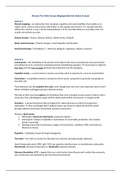Glossary The Other Europe (Begrippenlijst Het Andere Europa)
Lecture 1
Mental mapping = an abstraction that comprises cognitive and mental abilities that enable us to
collect, store, retrieve and process information on the spatial environment a mental map thus
reflects the world in a way a human being believes it to be, but distortions are very likely since it is
usually not entirely accurate.
Eastern Europe = Russia, Ukraine, Belarus, (Baltic States, Finland).
(East) Central Europe = Poland, Hungary, Czech Republic and Slovakia.
South East Europe (‘’the Balkans’’) = Romania, Bulgaria, Yugoslavia, Albania, (Greece).
Lecture 2
Communism = the abolishing of the private ownership of the means of production and communism
everything has to be commonly owed/government (establishing equality) Communism is linked to
Karl Marx and the class struggle between the proletariat and the bourgeois.
Capitalist society = a society based on private ownership which is subjected to a process of polarisation.
Polarisation = competition between companies which causes companies to go broke and people to
lose their job.
The proletariat was the property-less class, even though they were the most important (due to their
labour activities) and biggest group in Russian society.
The idea of Marx was that nations are formations that have emerged at some point in history and in
some way, they will disappear again and the whole world will be communist/ a merged world.
Socialism = a broad movement that emerged from radical democracy and from progressive
nationalism Marx and Engels didn’t believe history was driven by ideals but that the world
through objective processes will develop towards communism.
Marxism: Basic tenets
1. Philosophy: historical materialism: productive sphere;
2. Sociological: critique of capitalism: implications of commodity production, free market,
private ownership;
3. Ideology and political movement: League of Communists, manifesto 1848, international,
Marxism in Russia.
Populism = mobilising masses through propaganda.
Terrorism = the wish to murder the (Russian) tsar and thus provoke popular upheaval.
Social-Democratic party 1898, split 1903 over question whether mass or revolutionary cadre party:
Mensheviki (minority/moderates) vs. Bolsheviki (majority/radicals).
February Revolution 1917 = toppled the tsar in the Soviet-Union/Russia and in which the monarchy
was overthrown and replaced by the Provisional Government.
, October Revolution 1917 = the Bolshevik Party seized power in Russia, inaugurating the Soviet
regime.
War communism = reckless mobilisation of all resources for Bolshevik victory, attained 1920.
Collectivisation = the aggregation of farmland, which meant that private ownership of land was
abolished, and all land belonged to all farmers equally, out of an ideology of collectivism
collectivisation due to the need of more productivity and more effective productivity of products.
Gulag = system of Soviet labour camps and accompanying detention and transit camps and prisons
that from the 1920s to the mid-1950s housed the political prisoners and criminals of the Soviet Union
(mostly capitalist/rich landowners whose land was seized by the government during the process of
collectivisation).
High Stalinism = a period in the USSR, during the 1930s, when villages were controlled by the regime
but had persistence of shortages of goods, social upheavals and ruralisation of towns occurred, and
an ineffective system was in place for the economy and state.
Communist International (Comintern) = the Comintern, an organisation of the Bolsheviks, was
established in 1919 to foster (communist) revolutions elsewhere in Europe.
Ideals of a Communist system
1. Monopoly of power (proletariat);
2. State ownership over all means of production/planned economy/collectivised agriculture;
3. Classless society.
Lecture 3
The Treaty of Brest-Litovsk = a peace treaty signed on March 3, 1918 between the new Bolshevik
government of Russia and the Central Powers (German Empire, Austria-Hungary, Bulgaria, and the
Ottoman Empire), that ended Russia's participation in WWI.
Appeasement policy = in international context, a diplomatic policy of making political or material
concessions to an aggressive power in order to avoid conflict (Hitler 1938).
Ribbentrop-Molotov Pact/Hitler-Stalin Pact = guarantee of peace by the Soviet-Union and Germany
(signed in 1939) towards the other, and a declared commitment that neither government would ally
itself to, or aid an enemy of the other party. In addition to stipulations of non-aggression, the treaty
included a secret protocol which defined the borders of Soviet and German spheres of influence
across the territories of Poland, Lithuania, Latvia, Estonia, and Finland.
Allied war conferences
1. Casablanca, January 1943: Roosevelt and Churchill decide to wage war until ‘’unconditional
surrender”;
2. Teheran, November-December 1943: ‘Big three’ (Roosevelt, Churchill and Stalin) decide on
Invasion in France, Polish post-war borders;
3. Yalta, January 1945: future shape of United Nations, Division of Germany, right of self-
determination of liberated countries (counts mostly for the countries in the zone of SU
influence: Western allies demanded that the SU left the countries with this right).





